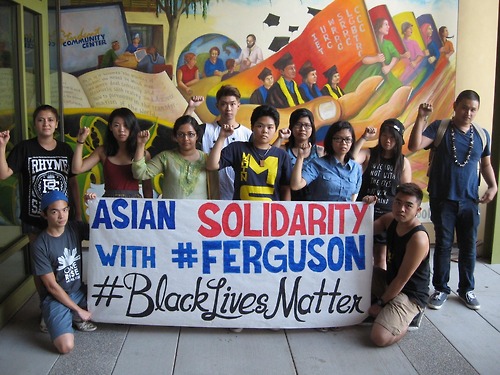
It has been nearly a month since the fatal shooting of unarmed teenager Michael Brown by Ferguson, Missouri police officer Darren Wilson, and in that time, the nation has become engrossed in a long overdue national conversation over race, race relations, racial profiling and police brutality. Countless think-pieces have been written about police brutality, school-to-prison pipelines, racial profiling, the myth of Black criminality, Black-on-Black crime, and cultural pathology. In this past month, it has seemed as if the entire country is struggling through their first “race moment”, forced by Brown’s untimely death to grapple with the fact of institutionalized racism against the Black body; this seems like an issue that too many would rather ignore.
Consequently, several mainstream media outlets have reported on the stark racial divide between Black and White Americans on Ferguson and whether or not racism is a problem in America; nearly half surveyed White Americans think Brown’s shooting death is being overracialized. While two-thirds of Black Americans think excessive force by police is a problem, only one-third of White Americans agree. This clear chasm between Black and White attitudes on race and police effectiveness is both well-documented and not altogether surprising: these answers are heavily influenced by one’s own personal experiences with racism and police brutality, and both economic and skin privilege often protects Whites from unjust run-ins with local police.
But where do Asian Americans — who are both people of colour yet who endure a completely different set of racial stereotypes in America than do other minorities — fall on questions of police brutality?
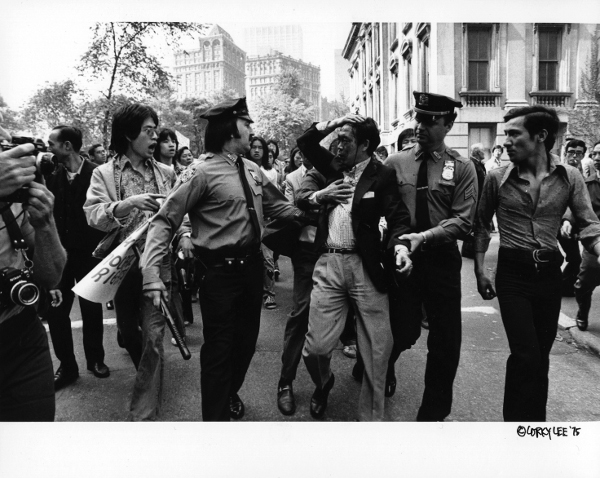
Between the week of September 2 – 8, just over 1,500 registered California voters were polled on a variety of issues, including their thoughts on police effectiveness and racial profiling; that poll included 131 Asian Americans. Their opinions are published as part of the larger statewide survey, and although this represents a very small sampling, the results are still interesting: in virtually all questions regarding police effectiveness, police brutality and racial profiling, Asian Americans responded more like other minority groups, and unlike Whites.
While only 18% of Whites thought police are ineffective and slow to respond when called, 47% of Blacks , 40% of Latinos and 24% of Asians agreed. 42% of Blacks, 28% of Latinos and 21% of Asians thought police were too aggressive, compared to only 11% of Whites.
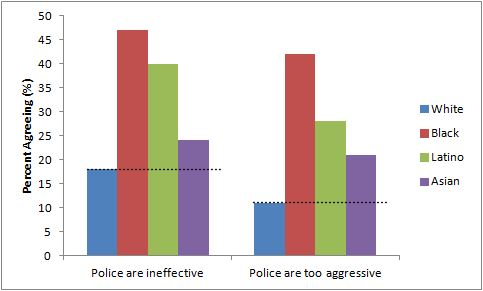
These findings mirror attitudes Asian Americans had on the police brutality issue more than thirty years ago, when several large protests were staged in local Chinatowns to protest police mistreatment and racial profiling of young Asian American youths. More recently, Asian Americans in Minneapolis took to the streets to protest the shooting death of unarmed Hmong American youth Fong Lee by police. Today, Asian American victims of police brutality continue to make headlines, as with the case of 84 year old Kang Wong who was beaten bloody by NYPD for jaywalking; or the case of Jessica Klyzek, an Asian American salon owner who was assaulted during a police raid while anti-Asian language was uttered by the arresting officers.
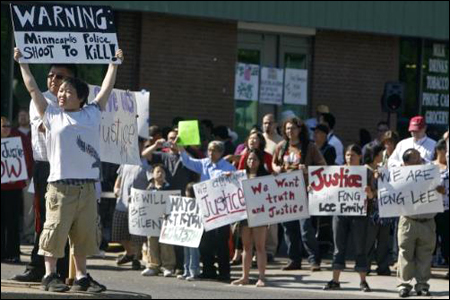
Despite these incidents, Asian Americans of today are candid about the realities of racial profiling and stereotypes in this country, and how the myth of Black criminality targets the Black body for violence. When asked whether or not the respondent believed police were engaging in racial profiling, 51% of Asian Americans believed police racially profiled — and most harshly targeted Black Americans (as did 61% of Blacks) — while only 33% of Whites agreed with that statement. Whites, on the other hand, were most likely to respond that police did not engage in racial profiling (44%), a far higher cross-section than the percentage of minorities who felt the same: 19% of Blacks, 34% of Latinos and 31% of Asian Americans.
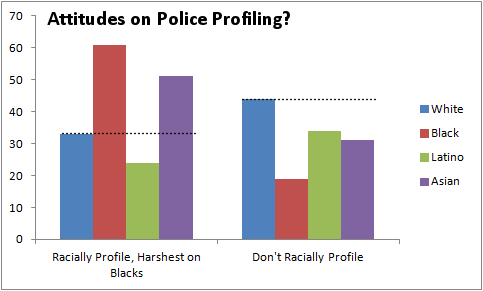
Yet, unlike other minority groups, contemporary Asian Americans responded more similar to Whites when it came to direct interactions with police. Whereas 26% of Blacks and 20% of Latinos said they felt they were treated unfairly in a personal encounter with police officers, only 11% of Asian Americans recounted this kind of incident (vs. 12% of Whites). When the question was extended to family, 40% of Blacks and 20% of Latinos knew a family member whom they felt was unfairly treated by police during a stop; only 9% of Asian Americans answered similarly (vs. 11% of Whites).
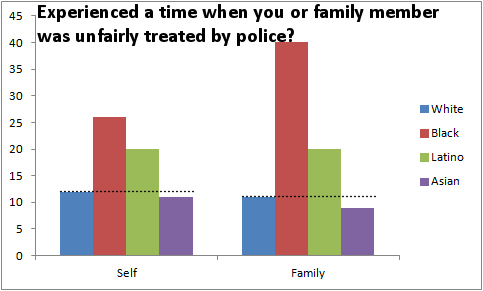
Only when asked about their larger social network did Asian Americans answer at a greater frequency than Whites: 22% of Asian Americans said they had a friend who had been treated unjustly by police compared to 15% of Whites (34% of Blacks and 29% of Latinos) agreed. These data can be readily explained by another recent poll that showed that most White people have predominantly White social networks, whereas the social networks of people of colour are typically more multiracial and diverse.
Thus, while surveyed Asian Americans were less likely to have personal experiences with unjust police brutality and mistreatment (which isn’t to say that racial profiling and police brutality doesn’t happen to us), it seems as if our identity as people of colour still influence our outlooks on race and police effectiveness in America. Our identity as non-White appears to make us either more aware and/or more sympathetic towards recognizing the spectre of race and racial profiling, even when we are not as commonly the victims of overt police force.
In short, Asian Americans are more likely to stand in solidarity with other communities of colour than are Whites: when asked within two weeks following Mike Brown’s shooting death whether survey respondents could think of an incident in the country where they felt a person was treated unfairly by police, 74% of Asian Americans said they could implying that as many as three-fourths of Asian Americans felt that Mike Brown’s shooting death was unjust; this number was more similar to the 79% of Blacks who answered the same. Only 64% of Whites felt the same way.
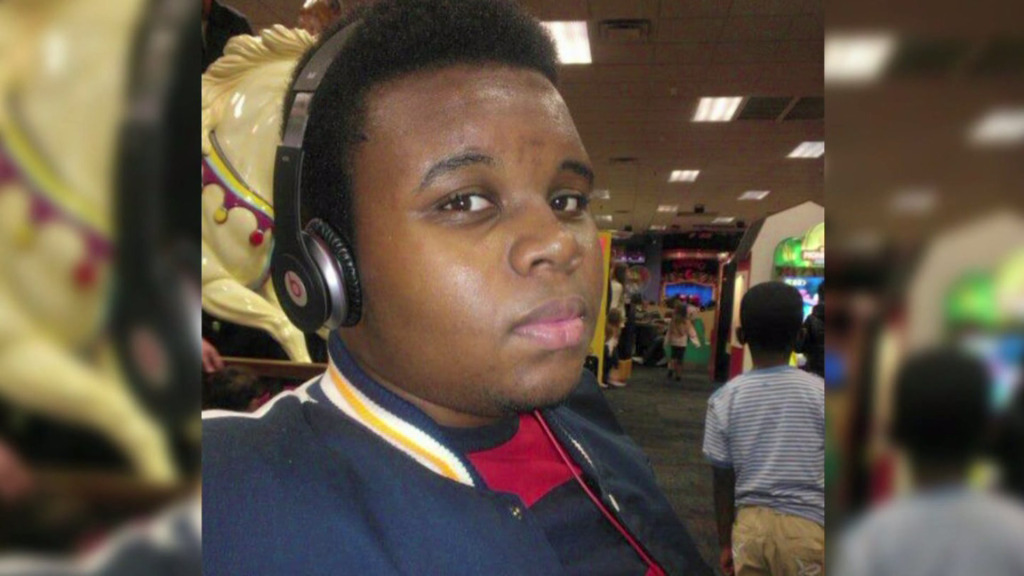
However, the USC Dornsife / LA Times survey also revealed that while Asian Americans answer like other minorities (and not like Whites) on political questions, we are also the least likely group of voters of all races to do something about it. 62% of Asian American survey respondents self-identified as either Democrat or independent-leaning Democrats (consistent with other survey results showing a 2-1 skew of liberals vs. conservatives among Asian Americans). Yet, a significantly fewer number of Asian Americans answered that they were almost certain to vote this November (55% vs 79% of Whites and 60% of Blacks), and Asians were most likely to respond that there was a 50-50 chance that they would show up at polls on election day (28% vs 8% of Whites and 20% of Blacks). These data are consistent with recent studies showing Asian Americans have among the lowest rate of voter registration and voter turnout of all voters by race; instead, we are more likely to cite alternative reasons — “too busy”, for example — than to show up at the polls.
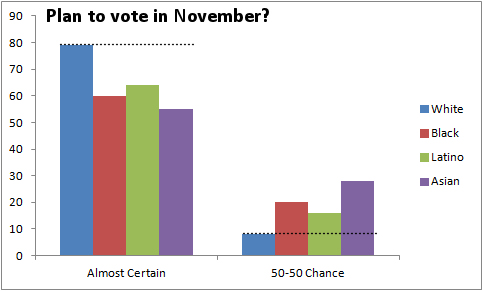
The take-home message of this survey is clear. Political power in this country comes not from surveys, but from the ballot box. Yet, while Asian Americans have strong political opinions on everything from police brutality to medical malpractice tort reform, obstacles remain in getting Asian American voters to translate those opinions into votes.
To that end, I urge you to take the time between now and November to educate yourself on the issues, and to commit to voting November 4th. It’s not enough to simply have an opinion on the issues of the day (as most Asian Americans clearly do); we must work harder to ensure we are heard.
